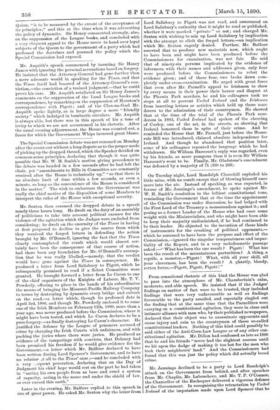Later in the evening, Mr. Balfour replied to this speech
in one of great power. He asked Mr. Sexton why the letter from Lord Salisbury to Pigott was not read, and announced on Lord Salisbury's authority that it might be read or published, whether it were marked " private " or not ; and charged Mr.
Sexton with wishing to mix up Lord Salisbury by implication with the attempt to elicit the forged letters,—an implication
which Mr. Sexton eagerly denied. Further, Mr. Balfour asserted that to produce new materials now, which ought to have been and might have been produced before the Commissioners for examination, was not fair. He said that of ninety-six persons implicated by the evidence of informers, with their names and addresses given, only four were produced before the Commissioners to rebut the evidence given; and of these four, two broke down com- pletely under cross-examination. He urged with great force that even after Mr. Parnell's appeal to Irishmen to show by every means in their power their horror and disgust at the Phcenix Park murders, he and his colleagues took no steps at all to prevent United Ireland and the Irishman from inserting letters or articles which held up those mur- derers to the admiration of their countrymen. He showed that at the time of the trial of the Phcenix Park mur- derers in 1883, United Ireland had spoken of the cheering of Curley, one of the set, in the streets, as showing that Ireland honoured them in spite of their crime. And he reminded the House that Mr. Parnell, just before the Home- rule Bill was introduced, claimed absolute independence for Ireland. And though he abandoned that position later, some of his colleagues repeated the language which he had withdrawn. Sir William Harcourt's reply was regarded, even by his friends, as more pompons than it is even Sir William Harcourt's wont to be: Finally, Mr. Gladstone's amendment was defeated by a majority of 71 (339 to 268).






































 Previous page
Previous page